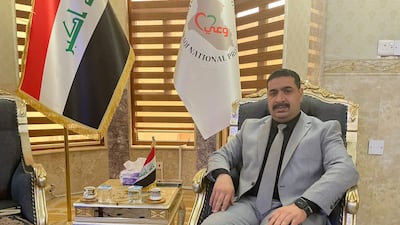The office of Khaled Sultan Hashem in Mosul’s Al Ziraai neighbourhood is a throwback to the Baath era of the Saddam Hussein regime.
Moustachioed men in leather jackets with Uzis tucked into their belts usher dignitaries in to meet the newly elected MP.
Mr Hashem's father, Ahmed Sultan Hashem Al Taii, was known as Saddam’s top general and was the man who signed the surrender agreement with the US in the First Gulf War, before going on to serve as minister of defence.
When the US invaded, Ahmed Sultan was in the highest echelons of the regime. He featured as the eight of hearts on the US’s deck of playing cards, which listed the Iraq’s most wanted.
Now, his son has been elected to Iraq's Parliament as an MP for Nineveh governorate, a radical progression for a family once so close to Saddam’s inner circle.
Though Mr Hashem was initially barred from standing, the election commission eventually reversed the decision, allowing him to run for the Iraqi National Project list – as the results stand, he is their only MP in Nineveh.
Although he would not grant any interviews, he was happy to pose for a photo for The National.
Mr Hashem’s victory was something of an outlier in a governorate which largely turned its back on established names in the October 10 general election. While stalwarts of the past two decades such as former prime minister Nouri Al Maliki and the populist cleric Moqtada Al Sadr performed well down south, in the troubled northern city occupied by extremist militants barely five years ago, the story is quite different.
The Al Nujaifi family, one of the biggest landowners in Nineveh, were wiped out electorally – with former vice president Osama Al Nujaifi losing his seat. His brother Atheel, who was governor when the city fell to ISIS, remains in exile in Erbil. Several other stalwarts of the governorate’s politics in recent years also lost their seats.
One of the winners in Nineveh was the Taqudum movement, a new list led by Mohammed Al Halbousi, the former speaker.
Mr Halbousi borrowed a tactic employed by former prime minister Haider Al Abadi’s Nasr coalition at the last election: inviting popular local figures to run on his list and relying on them to bring in votes from their communities. Among them is Muzahim Al Khayat, a former chancellor of Mosul University, who was elected in Nineveh’s second district.
Ahmed Al Jabouri, a shopkeeper in the eastern Mosul neighbourhood of Karama, said that though he felt there was little hope of change, he voted for a new candidate after a lifetime of supporting the Al Nujaifi family.
Another of Saddam’s former associates, cigarette mogul Khamis Khanjar, failed to perform despite pouring vast sums of money into the governorate. Mr Khanjar’s Azm movement picked up only one seat in Nineveh, mirroring a disastrous performance across the country.
“There were many independent candidates to choose from and even many of the bigger parties gave us new faces to vote for; there was more choice in this election,” Mr Al Jabouri said.
The Kurdish Democratic Party performed strongly, taking nine of the governorate’s 31 seats due largely to a strong showing among minority groups in the rural areas outside of Mosul, said Vian Dakhil, a Yazidi MP who was re-elected.
“We got a lot of support from minorities – there are many minority supporters of the KDP in Mosul among the Christians and the Shabak,” she told The National.
“I think some people have changed their minds about those big leaders, especially since ISIS in 2014. People in Nineveh know who the right people are to go to the Parliament."
Despite Nineveh’s Sunni majority, Iran-backed groups managed to make notable inroads through minority and independent candidates.
Waad Qado, the former head of the Hashed Al Shaabi’s 30th brigade, was elected as an independent.
The Hashed Al Shaabi, or Popular Mobilisation Forces are a militia umbrella organisation, comprising a variety of paramilitary groups mainly backed by Iran.
Though a Shabak, Mr Qado is widely regarded as close to the Iran-backed groups which dominate the PMF – some go as far as to call him Iran’s man in Nineveh. Posters on the main motorway to Mosul from Erbil show him next to Abu Mahdi Al Muhandis, the former de facto head of the PMF, and Iranian general Qassem Suleimani. Both men were killed in a US drone strike near Baghdad airport in January 2020.
Similarly, the governorate’s Christian quota seat went to the Babylon movement, a group widely seen as a proxy of the Iran-backed Badr organisation headed by Hadi Al Amiri.
Even in the north, Iran’s reach can be felt.


